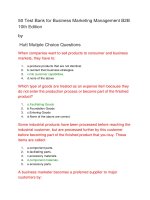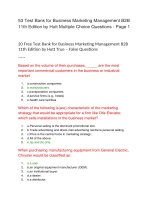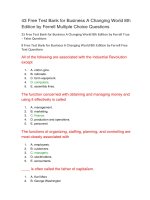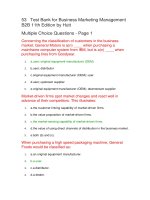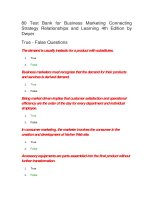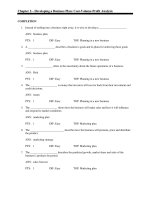Test bank for accounting information for business decisions 1st
Bạn đang xem bản rút gọn của tài liệu. Xem và tải ngay bản đầy đủ của tài liệu tại đây (87.25 KB, 17 trang )
Test Bank for Accounting Information for Business
Decisions 1st
Mutiple Choice Questions
Which of the following would a manager do as a part of planning activities?
1.
a.Compare estimates to benchmarks.
2.
b.Purchase inventory.
3.
c.Hire employees.
4.
d.Prepare cost estimates.
Which of the following summarises the results of a business’ operating
activities for a specific time period?
1.
a.Income statement
2.
b.Cash flow statement
3.
c.Balance sheet
4.
d.Payables ledger
Financial position of a business can best be evaluated with which of the
following?
1.
a.Net income.
2.
b.Assets, liabilities and owner’s equity.
3.
c.Cash received and paid.
4.
d.Owner investments.
The business’ obligations to its creditors are:
1.
a.Liabilities.
2.
b.Expenses.
3.
c.Payments.
4.
d.Owners' equity.
What is the primary difference between a manufacturer and a merchandiser?
1.
a.Merchandisers purchase finished goods ready to sell, whereas a manufacturer must
create the goods.
2.
b.Manufacturers purchase finished goods ready to sell, whereas a merchandiser must
create the goods.
3.
c.Merchandisers do not sell directly to the public, but rather only to manufacturers.
4.
d.Manufacturers buy the finished goods from a merchandiser then resell it, basically
acting as a middle man.
Which of the following is an example of a manufacturer?
1.
a.Dell Calculator
2.
b.Bob’s lawnmower services
3.
c.Air NZ
4.
d.Qantas
Managerial accounting information:
1.
a.is a one size fits all approach to reporting business results.
2.
b.can be tailored to the needs of the internal user.
3.
c.follows GAAP in the reporting process.
4.
d.helps shareholders make decisions.
Which of the following summarises a business’ financial position on a given
date?
1.
a.Income statement
2.
b.Cash flow statement
3.
c.Balance sheet
4.
d.Budget
A lack of solvency is demonstrated when:
1.
a.assets are greater than liabilities.
2.
b.liabilities are greater than assets.
3.
c.revenues are greater than expenses.
4.
d.expenses are greater than revenues.
Which of the following do not cover a period of time?
1.
a.Income statement.
2.
b.Cash flow statement.
3.
c.Balance sheet.
4.
d.Accounts receivable ledger .
Operating activities consist of:
1.
a.how products get made and sold.
2.
b.measuring actual operations and progress against a standard or benchmark.
3.
c.establishing business goals.
4.
d.establishing means of achieving business goals.
The business’ economic resources are:
1.
a.Revenues.
2.
b.Liabilities.
3.
c.Owners' equity.
4.
d.Assets.
Which of the following summarises a business’ receipts and payments?
1.
a.Budget.
2.
b.Income statement.
3.
c.Balance sheet.
4.
d.Cash flow statement.
Which of the following is false?
1.
a.Accounting keeps track of a business’ economic resources and activities, then
reports the results and financial position to users who have an interest.
2.
b.Accounting is a mere numbers game. The information is only useful to a limited few.
The reality is that few managers need accounting information to make quality operating
decisions.
3.
c.Accounting focuses on the resources and activities of individual businesses.
4.
d.Products and services affect almost every minute of our lives.
Financial accounting information:
1.
a.is a one size fits all approach to reporting business results.
2.
b.can be tailored to the needs of the internal user.
3.
c.follows statements on management accounting in the reporting process.
4.
d.helps only external users make decisions.
Evaluating activities consist of:
1.
a.establishing business goals.
2.
b.establishing a means of achieving business goals.
3.
c.providing feedback to managers to correct deviations from standards.
4.
d.setting benchmarks or standards.
Statements on management accounting:
1.
a.are binding and contractual in nature.
2.
b.are general guidelines management accountants may turn to when faced with new
situations to resolve.
3.
c.are developed primarily to guide the structure of reporting to external users.
4.
d.are issued by CPA Australia.
Which type of business organisation generates the greatest volume of
business?
1.
a.Proprietorships.
2.
b.Partnerships.
3.
c.Company/corporation.
4.
d.Each generates roughly the same amount of business.
A budget:
1.
a.quantifies management’s plans.
2.
b.determines and evaluates the cost of specific products or activities in a business.
3.
c.compiles actual costs for a given period.
4.
d.is used to determine if a product should be continued or discontinued.
True-False Questions
An internal user would receive “tailor-made” information from the accounting
system.
1.
True
2.
False
Feedback from operations can be effectively used in the planning, operating
or evaluating stages of a business.
1.
True
2.
False
An external user would receive “tailor-made” information from the accounting
system.
1.
True
2.
False
Accounting keeps track of a business’ economic resources and activities,
then reports the results and financial position to users who have an interest.
1.
True
2.
False
Many businesses have no need for accounting information and can actually
exist without an accounting system.
1.
True
2.
False
Sole proprietorships are the most common form of business and as such,
conduct more volume of business than partnerships and corporations put
together.
1.
True
2.
False
Unless you are a business owner, you will not be making business decisions.
1.
True
2.
False
The term ‘Private Enterprise’ means that businesses keep their accounting
information private.
1.
True
2.
False
A business’ accounting system would provide information for both external
and internal users.
1.
True
2.
False
External users possess skills to extract the information they need for
decisions from the accounting information of a business.
1.
True
2.
False
Woolworths is an example of a retailing business.
1.
True
2.
False
Accounting is an information tool which can help make good business
decisions.
1.
True
2.
False
Evaluating is the process of establishing the business’ goals and objectives.
1.
True
2.
False
Operating refers to the set of activities that the business engages in to
conduct its business according to its plan.
1.
True
2.
False
A dental surgery is an example of a service business.
1.
True
2.
False
Sources of capital for a business include owner investments, borrowing or
seeking investments from outsiders.
.
1.
True
2.
False
Free Text Questions
What is the purpose of a code of ethics?
Answer Given
Many situations and decisions are conducted in an environment in which there is not a
clear right or wrong. Many situations fall between the two extremes. A code of ethics is
designed to provide guidance to various people in maintaining high ethical standards
when faced with difficult decisions.
A business financial statements is meant to convey information about the
business to ________ and __________ users in order to help them make
decisions about the business.
Answer Given
internal, external
What are the primary differences between companies/corporations and
partnerships/sole proprietorships?
Answer Given
Company/corporations are legally established as entities separate from their owners.
The company/corporation issues capital stock to its owners as evidence of their
ownership. The stock is readily transferable to other owners. Sole proprietorships and
partnerships are not legally organised separately from their owners.
_________________________ are the most common type of business
organisation.
Answer Given
Sole proprietorships or sole traders
____________________ are merchandising businesses that sell their products
directly to the final customer or consumers.
Answer Given
Retailers
__________ ___________ is a system in which individuals own businesses
that produce and sell services and/or goods for a profit.
Answer Given
Private enterprise
Describe the planning function of management.
Answer Given
This is the start of management. The plan lays out the organization of and provides
direction to the operating and evaluating activities. Planning establishes the business’
goals and the means of achieving those goals. Planning identifies the resources and
employees necessary to achieve the business’ goals. It also sets standards against
which to measure achievement. This allows management to adjust future strategy.
Describe the evaluating function of management.
Answer Given
Evaluation measures the actual operations and progress against standards and then
acts to correct deviations from the standards. It is a continuous process that attempts
to prevent problems from occurring and to minimise their effect if they do occur.
What is the role of the budget in management?
Answer Given
The budget is the result of quantifying management plans and showing the impact of
these plans on the business’ operations. Once the planned activities have occurred,
managers can evaluate the results against the budget to make sure that the actual
operations have achieved the desired results.
____________________ refers to the funds a business needs to operate or
expand operations.
Answer Given
Capital
An __________ ___________ is a means by which accounting information
about a business’ activity is identified, measured, recorded and summarised
so it can be communicated in an accounting report.
Answer Given
accounting system
What is the role of manufacturing cost reports in management?
Answer Given
Manufacturing cost reports are used to monitor and evaluate a business’ operations.
The manufacturing cost report can highlight variances of actual costs from budgeted
costs. This might allow the manager to take corrective action.
____________________ are businesses owned by two or more individuals.
Answer Given
Partnerships
An ____________________ is an individual who is willing to risk the
uncertainty of not knowing if customers will buy what their business provides,
in exchange for the reward of a profit, along with the reward of seeing their
business succeed.
Answer Given
entrepreneur
What is the role of accounting information in business?
Answer Given
Accounting information helps decision-makers. It aids managers by providing
quantitative information about the business to help them in planning, operating, and
evaluating the business’ activities. Accounting information helps external decisionmakers by providing them with financial statements containing economic information
about the performance and state of the businesses.
____________________ businesses purchase goods for resale to their
customers.
Answer Given
Merchandising
What are some of the issues addressed by accountants' codes of ethics?
Answer Given
The International Federation of Accountants (IFAC) and AICA (Australian Institute of
Chartered Accountants) and, NZICA (New Zealand Institute of Chartered Accountants)
code of ethics considers issues such as self-discipline, honourable behaviour, moral
judgments, the public interest, professionalism, integrity, and technical and ethical
standards. The different code of ethics addresses competence, confidentiality,
integrity, objectivity, and resolution of ethical conduct. The code of ethics also
addresses objectivity, resolution of conflicts, professional competence, confidentiality,
tax practice, cross-border activities and publicity. It also addresses independence,
fees, and activities incompatible with the practice of accounting, advertising and
soliciting.
Briefly describe what information is contained in the balance sheet
Answer Given
The assets section lists the business’ economic resources, such as cash, inventories,
and equipment. The liabilities section lists the business’ obligations to its creditors,
such as banks, suppliers, and employees. The owners' equity section shows the
owner's current investment in the assets of the business (the contributions of the
owner plus the cumulative retained earnings of the business).
Information explosion, evolving forms of businesses, more complex business
activities, increased regulations, globalisation and technological advances are
all factors affecting the ______________of the business environment.
Answer Given
complexity
_________________________ are issued to the owners of a company as
evidence of their investment of capital in the business.
Answer Given
Company shares
What activities contribute to the operations of a business?
Answer Given
Managers set goals, make decisions, and commit the business’ resources in an
attempt to achieve those goals. Planning provides organisation and direction for the
business. Operating involves gathering the necessary resources and employees and
implementing the plans. Evaluating measures the actual progress against standards or
benchmarks so problems can be corrected.
Describe the operating function of management.
Answer Given
This set of activities allows the business to conduct its business according to plan.
They include gathering the necessary resources and employees to achieve the
business’ goals. Day-to-day decisions are made about how to best achieve the goals.
Define entrepreneurship.
Answer Given
Entrepreneurship is a combination of three factors: the entrepreneur's ideas, the
willingness of the entrepreneur to take risks, and the abilities of all of the business’
personnel to use capital to produce and sell goods or services.
What is the role of cost analysis in management?
Answer Given
Cost analysis is the process of determining and evaluating the costs of specific
products or activities within a business. Cost analysis is used when making decisions
about these products or activities. Such a decision might include whether to continue a
particular product line.
Briefly describe what information is contained in an Income Statement .
Answer Given
A business’ income statement summarises the results of its operating activities for a
specific time period and shows the business’ profit for that period. This is what the
business charged its customers for services or goods provided to them. It also
summarises the business’ expenses. This is the cost to the business of providing
those goods and services. Net income is the difference between revenues and
expenses.
What is private enterprise?
Answer Given
Private enterprise is a system in which individuals own businesses that produce and
sell services and/or goods for a profit. These businesses include service businesses,
merchandising businesses, and manufacturing businesses.
A ____________________ is a business organisation that has a separate
identity from its owners.
Answer Given
Company/Corporation
What sources of capital are available to an entrepreneur? How do these
sources of capital differ?
Answer Given
The two primary sources of capital are the owner's investment and borrowing. The
owner hopes to get a return on his/her investment greater than the amount that would
be obtained from a different investment. Borrowings require repayments, along with
interest payments. If the borrowed money cannot be repaid, then the business may
become insolvent and cease operations.
_________ ___________ perform services or activities that benefit individuals
or business customers.
Answer Given
Service businesses
_________________________ are businesses owned by one person who is the
sole investor of capital into the business.
Answer Given
Sole proprietorships or sole traders
____________________ businesses make their products and then sell these
products to their customers.
Answer Given
Manufacturing
Suppose that you are the manager of a business that manufactures various
types of athletic shoes for sale primarily in Australia. Discuss the pros and
cons of locating your manufacturing plants abroad versus in Australia.
Answer Given
The regulatory environments might be very different between Australia and the
international location. The tax structures might differ considerably. This might lead to
substantial tax saving. Minimum wage laws and working condition standards are
present in Australia and might be non-existent abroad. This could lead to substantial
labour savings abroad. If the plant were located abroad, restrictions on the flow of
cash might make it difficult to bring your profits home. Some countries restrict foreign
ownership of assets. The supply lines might be much longer, and burdened by
import/export regulations. This might cause difficulties in delivering the product on a
timely basis.
____________________ are merchandising businesses that sell their goods to
retailers or other commercial users.
Answer Given
Wholesalers
What are the primary similarities and differences between service business
and merchandising/manufacturing businesses?
Answer Given
Service businesses and merchandising/manufacturing businesses are trying to earn a
profit from selling to a customer. The difference is in what is sold. Service businesses
provide a service to their customers, while merchandising and manufacturing
businesses provide goods to their customers.
Define generally accepted accounting principles.
Answer Given
Accounting principles are the set of currently accepted principles, procedures, and
practices that are used for financial reporting in Australia and New Zealand. The
principles must be followed in the external reports of all businesses that sell stock to
the public in Australia and New Zealand, as well as many other businesses.
